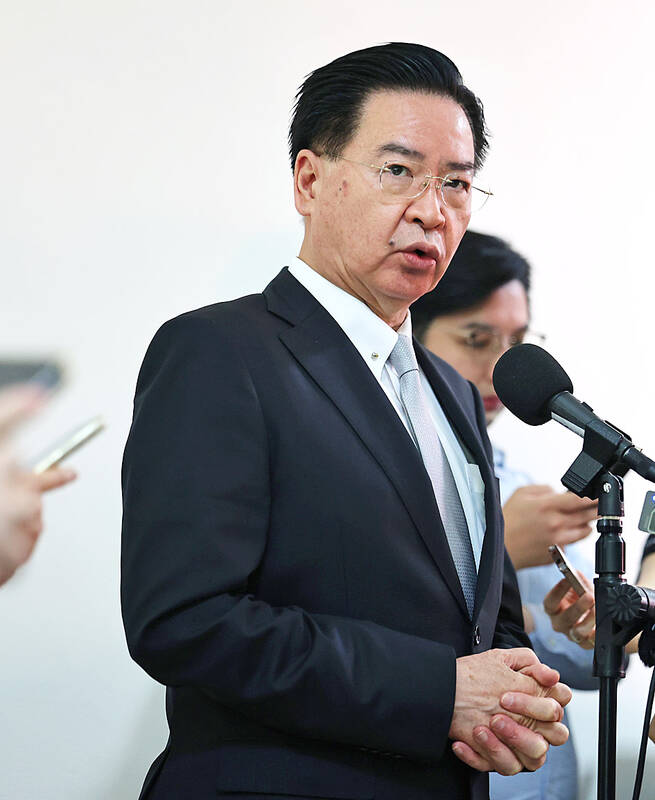Taiwan intends to fight for itself in any armed conflict with China and is unclear as to what countries might stand beside it, Minister of Foreign Affairs Joseph Wu said (吳釗燮).
In an interview on Friday last week with Sky News Australia, Wu said that Taiwan, with a population of 23 million compared to China’s 1.4 billion, has to defend itself and is not asking other countries to fight for it.
Regarding who might fight alongside Taiwan in the event of a war with China, Wu said: “This is a very good question.”

Photo: CNA
“A lot of people are debating strategic ambiguity or strategic clarity, but to us, we know our own responsibility,” Wu told the news channel from Taipei.
“Taiwan has to defend itself, the people have to defend Taiwan, this country, and we are determined to defend ourselves and we are not asking other countries to fight for Taiwan,” he said.
US President Joe Biden has repeatedly said that US forces would help defend Taiwan, although US official policy remains ambiguous over if and how forces would be dispatched.
Australian Minister for Defence Richard Marles in March said that his country had made no promise to support the US in any conflict over Taiwan as part of an agreement to obtain US nuclear-powered submarines.
Biden and the leaders of Australia and the UK have announced that Australia would purchase nuclear-powered attack submarines from the US to modernize its fleet, amid growing concern about China’s influence in the Indo-Pacific region.
Australian critics of the deal say that the US would not hand over as many as five of its Virginia-class submarines without assurances that they would be made available in the event of a conflict with China over Taiwan.
Asked if Taiwan was destined for war, Wu said: “I certainly hope not.”
“The reason is very clear: War means devastation, not just for the one who got attacked, but possibly also for other countries as well,” he said.
“And therefore, at this moment, even though we see that the tension has been rising and the conflict seems to be more likely and peace is less likely to maintain, but we need to do everything to prevent war from happening,” he said.
Wu said that Taiwan is working to maintain the “status quo” — essentially de facto independence without a formal declaration.
The US remains Taiwan’s closest military and political ally, despite the lack of formal diplomatic ties between them. US defense officials have warned of the potential of conflict in coming years and US forces have been bolstering their presence in Asia, most recently in the Philippines, to respond to such a contingency.

SHIPS, TRAINS AND AUTOMOBILES: The ministry has announced changes to varied transportation industries taking effect soon, with a number of effects for passengers Beginning next month, the post office is canceling signature upon delivery and written inquiry services for international registered small packets in accordance with the new policy of the Universal Postal Union, the Ministry of Transportation and Communications said yesterday. The new policy does not apply to packets that are to be delivered to China, the ministry said. Senders of international registered small packets would receive a NT$10 rebate on postage if the packets are sent from Jan. 1 to March 31, it added. The ministry said that three other policies are also scheduled to take effect next month. International cruise ship operators

NUMBERS IMBALANCE: More than 4 million Taiwanese have visited China this year, while only about half a million Chinese have visited here Beijing has yet to respond to Taiwan’s requests for negotiation over matters related to the recovery of cross-strait tourism, the Tourism Administration said yesterday. Taiwan’s tourism authority issued the statement after Chinese-language daily the China Times reported yesterday that the government’s policy of banning group tours to China does not stop Taiwanese from visiting the country. As of October, more than 4.2 million had traveled to China this year, exceeding last year. Beijing estimated the number of Taiwanese tourists in China could reach 4.5 million this year. By contrast, only 500,000 Chinese tourists are expected in Taiwan, the report said. The report

Temperatures are forecast to drop steadily as a continental cold air mass moves across Taiwan, with some areas also likely to see heavy rainfall, the Central Weather Administration (CWA) said. From today through early tomorrow, a cold air mass would keep temperatures low across central and northern Taiwan, and the eastern half of Taiwan proper, with isolated brief showers forecast along Keelung’s north coast, Taipei and New Taipei City’s mountainous areas and eastern Taiwan, it said. Lows of 11°C to 15°C are forecast in central and northern Taiwan, Yilan County, and the outlying Kinmen and Lienchiang (Matsu) counties, and 14°C to 17°C

STEERING FAILURE: The first boat of its class is experiencing teething issues as it readies for acceptance by the navy, according to a recent story about rudder failure The Hai Kun (海鯤), the nation’s first locally built submarine, allegedly suffered a total failure of stern hydraulic systems during the second round of sea acceptance trials on June 26, and sailors were forced to manually operate the X-rudder to turn the submarine and return to port, news Web site Mirror Daily reported yesterday. The report said that tugboats following the Hai Kun assisted the submarine in avoiding collisions with other ships due to the X-rudder malfunctioning. At the time of the report, the submarine had completed its trials and was scheduled to begin diving and surfacing tests in shallow areas. The X-rudder,